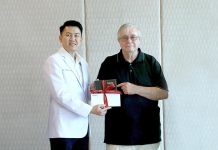Having now been a doctor for over 40 years, I have begun writing another book. Not another one on life in Thailand (Farang and Farang The Sequel), but snippets of my medical life – highs, lows, funny bits and sad bits. Here is an extract from one of the early chapters.
After I graduated in the UK, like all new doctors, you have to do a year’s internship in a hospital. In the UK, this is called your pre-registration year. In other words, you work under supervision to ensure you kill as few patients as possible.
For the brand new doctor, with a brand new shiny name badge, this is a fairly trying time, and a year in which you find out just how much you don’t know. For me, I was quite confident that I would be able to diagnose the seventh beta cell adenoma of the pancreas ever found in the world, but I had no idea what to do for tonsillitis in children, of which there are probably seven million cases every month. The undergraduate education system had many deficiencies.
It is at this time that the tyro doctor has to bow to superior knowledge – not the specialist doctor to whom you are seconded, but to the nursing sisters in charge of the wards you work in. For me that was ‘Unders’ (Sister Underhill) and ‘Robby’ (Sister Robinson). It was those two experienced ladies who successfully, I might add, got me through the first six months of my ‘medical’ pre-registration.
My first job every morning was to take blood samples from the patients, after the requests left by the more senior doctors, who did not have to take their own ‘bloods’. One particular morning I grabbed my list and began collecting. Everything was going well, until I had to take blood from Mr. Jackson. He lay there quietly enough, and even though I was sure I had the needle in the vein, the amount of blood issuing was very slight and very slow. However, I persisted, as I did not want to admit to failure in front of Unders and Robby. After 15 minutes I had enough blood for a sample and returned the tubes to the Ward Sister’s desk. “How did you go with Mr. Jackson?” asked Unders. “Very difficult and very slow, but I managed it,” I said proudly. “Not bad,” said Unders. “He’s been dead for two hours.” After that salutary lesson I always spoke to any patient from whom I was to extract a blood sample.
Every week we had a ‘Grand Rounds’ where the entire medical and nursing team would visit each patient in the medical wards. Around the bed would be (in order) the Senior Consultant, the Senior Registrar, the Junior Registrar, the Senior House Officer, the Junior House Officer (me), the Nursing Sister, the Charge Nurse and then all the little nurses. The order was sacrosanct and obviously steeped in medical history, because if I moved myself up the order while walking to the next bed, I would be elbowed out by my superiors, and if I dallied, and moved down the order, then the nursing staff would regroup behind me and push me forwards.
It is rare to forge long-lasting friendships as a junior doctor. You are only there for six months before you move on to another teaching hospital for the second six months. However, I did get quite friendly with one of the surgical team, a Pakistani royal, Prince Siraj Ghazali.
When we were registered on call on the same evenings, on those occasions it was my pleasure to dine with the Prince. Hospital food is almost universally dreadful, at any hospital I have worked in all over the world. Often I felt that patients got better to escape the food!
Siraj had that Asian charm, which he could turn on at will, and he would charm the hospital cook. While the rest of the doctors ate mass produced slop, the Prince and his friend would have a special table set up, complete with starched tablecloth and partake of an English cook’s idea of a Pakistani curry. At least it was better than the standard fare.




